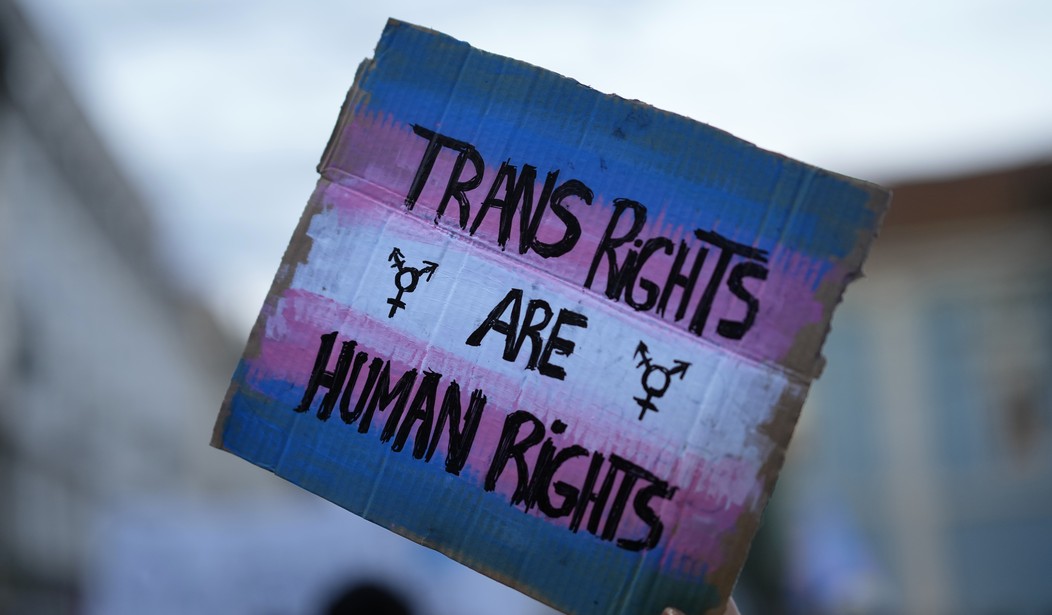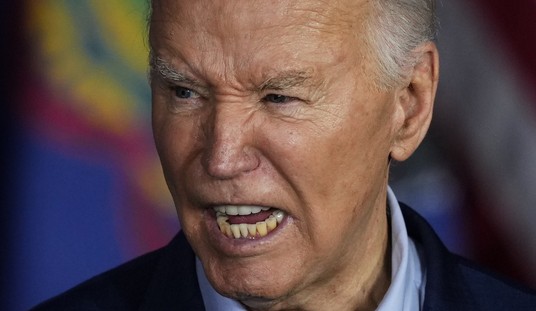The opinions expressed by contributors are their own and do not necessarily represent the views of RedState.com.
The Eleventh Circuit Court of Appeals made an astonishing ruling on Friday. It ruled that high school kids must use the bathroom belonging to their biological sex, not the one they feel they should use. I say “astonishing” because the transgender craziness has become such a part of progressive culture that just a few months ago, you could be banned from Twitter for saying that.
The plaintiff, “Drew” Adams, is a student in St. Johns County, Florida, public schools. Drew is a biological female but is convinced, with parental support, that she is male. Because she believes she is male, she insisted on using the boys’ bathroom. The school said, “not so fast, Scooter,” and directed Adams to use either the girls’ bathroom or the “gender neutral” bathroom. This was an unconscionable violation of feelings. This is how one of the dissents in this 7-4 decision by the full Eleventh Circuit described the demeaning ordeal that going potty meant to “Drew.”
Each time teenager Andrew Adams needed to use the bathroom at his school, Allen D. Nease High School, he was forced to endure a stigmatizing and humiliating walk of shame—past the boys’ bathrooms and into a single-stall “gender neutral” bathroom. The experience left him feeling unworthy, like “something that needs to be put away.”
(My, how times have changed. In my high school, you had to be moderately insane or have a death wish to use the boys’ bathroom.)
When the trial court heard the case, the judge ruled in favor of “Drew” and ordered the school district to stop being meany-pants and ordered them to pay $1,000 in damages. Judge Timothy Corrigan (a George W. Bush appointee) ruled:
“[T]he evidence is that Drew Adams poses no threat to the privacy or safety of any of his fellow students. Rather, Drew Adams is just like every other student at Nease High School, a teenager coming of age in a complicated, uncertain and changing world. When it comes to his use of the bathroom, the law requires that he be treated like any other boy.”
To call this statement fatuous nonsense would be to give it high praise.
The school district appealed. The appeal was opposed by “over a dozen” major corporations doing business in FL (I have not been able to find their names, if you do, drop a note in the comments, and I’ll update), 21 state attorneys general (California, Connecticut, Delaware, Hawaii, Iowa, Illinois, Massachusetts, Maryland, Maine, Michigan, Minnesota, New Jersey, New Mexico, New York, Oregon, Pennsylvania, Rhode Island, Virginia, Vermont, Washington, and the District of Columbia), and, naturally, the Biden Justice Department. St. Johns County was supported by 18 states (Arizona, Arkansas, Georgia, Indiana, Kansas, Kentucky, Louisiana, Mississippi, Missouri, Montana, Nebraska, Ohio, Oklahoma, South Carolina, South Dakota, Tennessee, Texas, and West Virginia).
The case went before a three-judge panel of the Eleventh Circuit (two Obama judges and one G. W. Bush judge), and it ruled, 2-1, that “Drew” could use the boys’ restroom.
Then we enter into the high comedy that is only possible when outcome-based jurisprudence is challenged. St. Johns County filed an appeal and asked for an en banc hearing by the whole court. The majority in the panel quickly amended their filing to try to head off the appeal.
Chief Judge Beverly B. Martin said that just after the panel had issued its original ruling last August, one member of the full 11th Circuit court took a procedural step that delayed the issuance of a final judgment in the case. That was evidently to give the full court time to consider whether to rehear the case.
“In an effort to get broader support among our colleagues, we vacate the opinion issued on August 7, 2020, … and replace it with this one,” Martin wrote. “This revised opinion does not reach the Title IX question and reaches only one ground under the Equal Protection Clause instead of the three Equal Protection rulings we made in the August 7 opinion.”
The gambit didn’t work; the Eleventh Circuit heard the case en banc and repudiated the decision by the panel majority.
This is how Jonathan Turley describes it:
Judge Lagoa begins the majority opinion by describing the dispute as involving “the unremarkable—and nearly universal—practice of separating school bathrooms based on biological sex.” In analyzing the “straightforward” claims, Lagoa laid out the facts and holding:
“Adams, who identifies as a male, argues that the policy violates Adams’s rights because, as a transgender student, Adams cannot use the bathroom that corresponds to the sex with which Adams identifies. Which is to say, Adams argues that by facially discriminating between the two sexes, the School Board’s bathroom policy also necessarily discriminates against transgender students. We disagree with Adams’s theory that separation of bathrooms on the basis of biological sex necessarily discriminates against transgender students.”
On the Equal Protection question, the court ruled that intermediate scrutiny applies to the case and that the district needs only show that the policy (1) advances an important governmental objective and (2) is substantially related to that objective. Miss. Univ. for Women, 458 U.S. at 724. The court found both criteria satisfied because the policy
“is clearly related to—indeed, is almost a mirror of—its objective of protecting the privacy interests of students to use the bathroom away from the opposite sex and to shield their bodies from the opposite sex in the bathroom, which, like a locker room or shower facility, is one of the spaces in a school where such bodily exposure is most likely to occur.”
On the Title IX issue, the court held that the statute allows schools to provide separate bathrooms on the basis of biological sex.
“That is exactly what the School Board has done in this case; it has provided separate bathrooms for each of the biological sexes. And to accommodate transgender students, the School Board has provided single-stall, sex-neutral bathrooms, which Title IX neither requires nor prohibits. Nothing about this bathroom policy violates Title IX. Moreover, under the Spending Clause’s clear-statement rule, the term “sex,” as used within Title IX, must unambiguously mean something other than biological sex—which it does not—in order to conclude that the School Board violated Title IX. The district court’s contrary conclusion is not supported by the plain and ordinary meaning of the word “sex” and provides ample support for subsequent litigants to transform schools’ living facilities, locker rooms, showers, and sports teams into sex-neutral areas and activities. Whether Title IX should be amended to equate “gender identity” and “transgender status” with “sex” should be left to Congress—not the courts.”
The complete decision is available at the end of this post.
However, three interesting things have emerged from this case.
First, the transgender lunacy is an article of faith among progressives. The dissent judges belittle the idea that gender is based on sexual organs and chromosomes.
“To start, the majority opinion simply declares—without any basis—that a person’s “biological sex” is comprised solely of chromosomal structure and birth-assigned sex.”
That is precisely 100% of sex/gender. Anything beyond that is a sexual fetish or mental aberration. No school, or business, should be required to make accommodations on those grounds. This is critical because it means that when fighting this bullsh**, we have to keep in mind that there is no longer a shared understanding of what these terms mean, at least among the people who would control our lives.
Second, this finding conflicts with a Fourth Circuit case that cost the Gloucester County (VA) School Board $1.5 million. The Supreme Court refused to take up the case for unstated reasons. So now we have a split where two circuits have decided the same issue based on the congruent fact sets and have arrived at different conclusions. It is hard to see how the Supreme Court avoids taking this case if “Drew” and “their” enablers decide to appeal.
Third, this case demonstrates how profoundly dangerous cutesy Supreme Court decisions can be. In June, Justice Neil Gorsuch wrote the profoundly stupid and mischievous decision Bostock vs. Clayton County. In that decision, he placed how one feels about one’s sex on the same plane as biological fact (Wall Street Journal behind-the-paywall link).
“The statute’s message for our cases is equally simple and momentous: An individual’s homosexuality or transgender status is not relevant to employment decisions,” Justice Gorsuch said, “because it is impossible to discriminate against a person for being homosexual or transgender without discriminating against that individual based on sex.”
It was clear from a simple example, he wrote: An employer has two workers who are attracted to men, one male, one female. If the male employee is fired because of that attraction, the “employer discriminates against him for traits or actions it tolerates in his female colleague.”
This, on its face, creates bizarre situations where it is illegal to keep male employees out of women’s locker rooms so long as lesbian employees are also allowed to window shop.
Even though he says:
“We do not purport to address bathrooms, locker rooms, or anything else of the kind. The only question before us is whether an employer who fires someone simply for being homosexual or transgender has discharged or otherwise discriminated against that individual ‘because of such individual’s sex,’” he wrote. Future litigation will resolve such disputes should they arise, he wrote.
This is patent nonsense. You can’t write a decision like that and not see the global ramifications. In fact, we already see this particular flock of chickens coming home to roost in the field of male poseurs cheating their way to victory in women’s sports (see Federal Appeals Court Uses Gorsuch Opinion to Hint Transgender Athletes Have a Constitutional Right to Play Women’s Sports). This decision rates up there with basically anything written by Anthony Kennedy and, like the “gay marriage” decision, is a malicious slap against traditional morality.
Despite Gorsuch claiming that Bostock had nothing to say about the use of high school bathrooms, his precedent was used in the en banc arguments to support “Drew’s” case. I mean, absolutely no one saw that coming, right?
This case, or a case like it, will make its way to the Supreme Court. There the Court will face a choice between an angels-dancing-on-the-head-of-a-needle ruling that only deals with bathrooms, or it will have to address the stupidity of Bostock head-on and either uphold it or overrule the decision. I hope by the time such a case arrives, Gorsuch can see the damage he’s done to our society and have the guts to admit his error and reverse himself.













